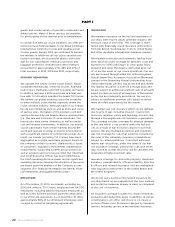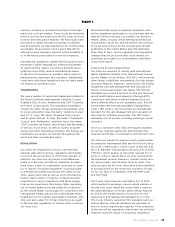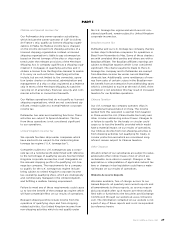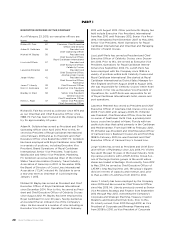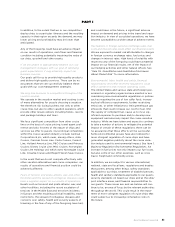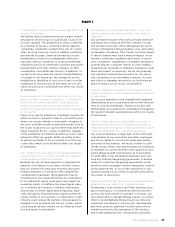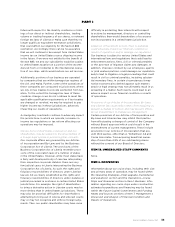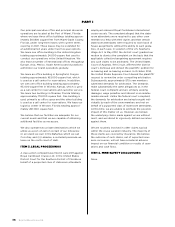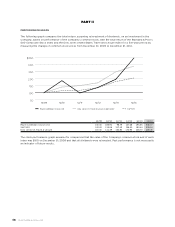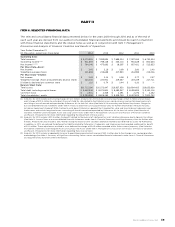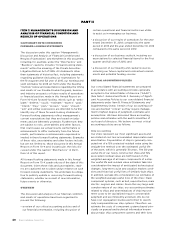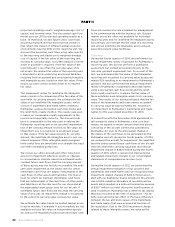Royal Caribbean Cruise Lines 2014 Annual Report Download - page 33
Download and view the complete annual report
Please find page 33 of the 2014 Royal Caribbean Cruise Lines annual report below. You can navigate through the pages in the report by either clicking on the pages listed below, or by using the keyword search tool below to find specific information within the annual report.
32 Royal Caribbean Cruises Ltd.
Conducting business globally may result in increased
costs and other risks.
We operate our business globally. Operating interna-
tionally exposes us to a number of risks, including
increased exposure to a wider range of regional and
local economic conditions, volatile local political
conditions, potential changes in duties and taxes,
including changing and/or uncertain interpretations
of existing tax laws and regulations, required compli-
ance with additional laws and policies affecting cruis-
ing, vacation or maritime businesses or governing
the operations of foreign-based companies, currency
fluctuations, interest rate movements, difficulties in
operating under local business environments, port
quality and availability in certain regions, U.S. and
global anti-bribery laws or regulations, imposition
of trade barriers and restrictions on repatriation of
earnings. We have recently expanded our presence
in China and, accordingly, our exposure to the risks
of doing business in the country. China’s economy dif-
fers from the economies of other developed countries
in many respects and, as the legal system in China
continues to evolve, there may be greater uncertainty
as to the interpretation and enforcement of applicable
laws and regulations.
Operating globally also exposes us to numerous and
sometimes conflicting legal, regulatory and tax require-
ments. In many parts of the world, including countries
in which we operate, practices in the local business
communities might not conform to international busi-
ness standards. We must adhere to policies designed
to promote legal and regulatory compliance as well as
applicable laws and regulations. However, we might
not be successful in ensuring that our employees,
agents, representatives and other third parties with
which we associate throughout the world properly
adhere to them. Failure by us, our employees or any
of these third parties to adhere to our policies or
applicable laws or regulations could result in penalties,
sanctions, damage to our reputation and related costs
which in turn could negatively affect our results of
operations and cash flows.
If we are unable to address these risks adequately, our
financial position and results of operations could be
adversely affected, including potentially impairing the
value of our ships, goodwill and other assets.
Our attempts to expand our business into new mar-
kets may not be successful.
While our historical focus has been to serve the
North American cruise market, we have expanded
our focus to increase our international guest sourcing,
including sourcing from the Asian, Latin American,
and Australian markets. Expansion into new markets
requires significant levels of investment. There can be
no assurance that these markets will develop as antic-
ipated or that we will have success in these markets,
and if we do not, we may be unable to recover our
investment, which could adversely impact our business,
financial condition and results of operations, including
potentially impairing the value of our goodwill.
Ship construction, repair or upgrade delays or
mechanical faults may result in cancellation of
cruises or unscheduled drydocks and repairs and
thus adversely affect our results of operations.
We depend on shipyards to construct, repair and
upgrade our cruise ships on a timely basis and in
good working order. The sophisticated nature of
building a ship involves risks. Delays in ship construc-
tion or upgrades or mechanical faults have in the past
and may in the future result in delays or cancellation
of cruises or necessitate unscheduled drydocks and
repairs of ships. These events and any related adverse
publicity could result in lost revenue, increased oper-
ating expenses, or both, and thus adversely affect our
results of operations.
Shipyards and their subcontractors may experience
financial difficulties or consolidation which could cause
or result in delay, ship cancellations, our inability to
procure new capacity in a timely fashion or increases
in shipbuilding costs that could adversely affect our
results of operations.
We rely on shipyards to construct, repair and upgrade
our ships. Financial difficulties, liquidations or closures
suffered by these shipyards and/or their subcontractors
may impact the timely delivery or costs of new ships
or the ability of shipyards to repair and upgrade our
fleet in accordance with our needs or expectations.
In addition, there are a limited number of shipyards
with the capability and capacity to build our new
ships and, accordingly, consolidation in the cruise
shipyard industry could impact our ability to con-
struct new ships when and as planned and/or could
result in stronger bargaining power on the part of the
shipyards and thus higher prices for our future ship
orders. Delivery delays and canceled deliveries can
adversely affect our results of operations, as can any
constraints on our ability to build, repair and maintain
our ships on a timely basis.
Our operating costs could increase due to market
forces and economic or geopolitical factors beyond
our control.
Our operating costs, including fuel, food, payroll, air-
fare, taxes, insurance and security costs are all subject
to increases due to market forces and economic or
political conditions or other factors beyond our con-
trol. Increases in these operating costs could adversely
affect our profitability.
PART I


